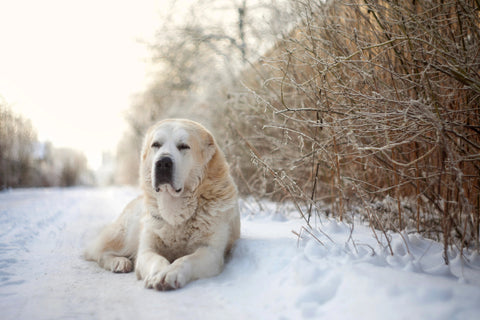Bladder stones in dogs are probably one of the most common urinary problems a pet parent might face. But what are bladder stones in dogs? What causes bladder stones? How an you recognize symptoms of bladder stones in dogs? And how can you go about preventing, managing, and treating dog bladder stones?

What are Bladder Stones?
Bladder stones are rock-like, hard masses of minerals that can be found in your dog's bladder. These bladder stones develop when the minerals in too concentrated urine are crystallized. According to VCA Hospitals, normal dog urine is slightly acidic and contains waste products from metabolism including dissolved mineral salts and other compounds.
There are many types of bladder stones but the most common types of bladder stones are struvite, calcium oxalate, and urate stones.
Struvite bladder stones. Struvite is an innate component of your dog's urine and it will remain dissolved as long as your dog's urine is acidic (not too concentrated). If your dog's urine turns out to be concentrated, struvite crystals will fall out of solution and will form struvite bladder stones.
Calcium oxalate bladder stones. A dog's urine that is high in calcium, citrates, or oxalates and is acidic develops calcium oxalate urinary crystals and stones.
Urate bladder stones. Urate bladder stones are usually the result of a canine genetic abnormality that causes a damage in uric acid metabolism.
What Causes Bladder Stones in Dogs?
The cause of bladder stones in dogs depends on the type of bladder stones your dog has. The struvite bladder stones are often caused by infections in a dog's urinary tract. Struvite is normally present in your dog's urine. However, when it becomes too concentrated, it causes crystalized urine in dogs. Females are more likely to experience these crystals in dog urine than males.
What causes bladder stones in dogs that are not struvite bladder stones? Other bladder stones in dogs are due to nutrient imbalances, metabolic abnormalities (high blood calcium), health conditions that are inherited. When effected, it will form crystals in dog pee, making it painful and difficult for them to urinate.
"The most common types of bladder stones in dogs are struvite, calcium oxalate, and urate stones."
Symptoms of Bladder Stones in Dogs
While a dog may not show the same symptoms of bladder stones in dogs every time, there are some to look out for. In general, dogs with bladder stones show the following symptoms:
- Urinary accidents
- Straining to urinate
- Many attempts to urinate but only urinates a little
- Needing to urinate more often than usual
- Discolored urine
- Pungent urine
- Constant licking of the private areas
- Licking around the urinary opening
- Having lower energy or a reduced appetite
- Vomiting
As VCA Hospital stated, the top most signs that your dog has bladder stones are hematuria (blood in the urine) and dysuria (straining to urinate). Blood in the urine happens because the stones rub against the bladder wall, irritating, and damaging the tissue & causing bleeding. If you notice these symptoms of bladder stones in dogs, it is recommended that you call your vet immediately.
Note: These symptoms eventually disappear when infection is treated and stones are flushed out/surgically removed from the body but will be recurring for bladder stones that are inherited.
Prevention, Management and Treatment for Bladder Stones in Dogs
Treatment for bladder stones in dogs can vary based on the size and severity. However, there is bladder stone treatment dogs can receive to help them through it. Here are options for treatment for bladder stones in dogs:
Consult Your Veterinarian
If ever you notice the signs mentioned above, consult with your vet immediately for proper diagnosis to determine the the type of bladder stone/s present in your dog and for the proper treatment fitted.
Vets can diagnose bladder stones in dogs by performing tests, like X-ray and abdominal ultrasound, according to Hill’s Pet. Your vet will probably also request you to submit a sample of your dog's pee for analysis and culture for bacteria. Because urinary tumors and urinary infections may have the same signs and symptoms as bladder stones, be mindful to follow all your vet's suggestions and treatment plans for bladder stone removal in dogs.
Additionally, there are three main treatment methods in treating bladder stones:
- Providing a special diet that will dissolve the stone(s). This is a passive method for bladder stone removal in dogs, but effective when the stones are small enough or few enough. Your vet will let you know if this is an option to remove bladder stones in your dog.
- Going through non-surgical removal: if the bladder stones are very small and few in number, it may be possible to place a special catheter into your dog's bladder and then flush the stones out. If possible, nonsurgical bladder stone removal in dogs is usually preferred to surgical removal.
- Surgical removal of bladder stones in dogs: Sometimes surgery is suggested in your dog if they have a large and many bladder stones. Your vet may recommend surgical removal of bladder stones in dogs if the risk of developing an obstruction in the urinary tract is extremely high, or if you, as a pet parent, wants to have the bladder stones removed as quickly and as soon as possible.
Have Your Dog Wear Diapers
As mentioned in the symptoms, accidents are common to dogs with bladder stones even if your dog is well-trained. Letting your dog wear Pet Parents® Dog Diapers will help keep your home clean and away from those messy clean-ups!
Additionally, since most dogs’ bladder stones developed them as a result of bladder infections, your vet might opt to place your furbaby on antibiotic treatment for bladder stones in dogs. This is essential because as the layers of stones are slowly being dissolved, bacteria that have become shut in in the layers of stones are spread into the bladder. If left untreated, these bacteria can start up another infection.
While the stones are still being dissolved, your dog will not be back to their full potty schedule yet and they might attempt to lick the antibiotics off of themselves. So, it is best to include dog diapers as a part of bladder stone treatment in dogs to help them along their healing process.
Provide a Healthy and Balanced Diet
A healthy and balanced therapeutic diet will provide your dog nutrients that will help provide them the nutrients they need. These diets should be low in protein, magnesium and phosphorus and must promote acidic urine. Examples include canned foods, increased water consumption, carbohydrates like white rice, sweet potato to replace protein reduction, low oxalate fruits and veggies like cauliflower, green peas, etc.
The use of special therapeutic diets to dissolve bladder stones is most of the times suggested by your vet if the risk of your furbaby developing urinary tract obstruction is moderately low. These diets help dissolve stones that are already in your dog's urine and prevent further formation of bladder stones. Bladder stones are further dissolved by an increase in water intake, which will help dilute your dog's concentrated urine.
Provide Bladder Supplements
Provide your dog with Pet Parents® Bladder SoftSupps®. These provide your dog with healthy ingredients to help bladder strength support like branded form of cranberry extract, Pacran®, & D-Mannose that help promote bladder health by flushing out bad bacteria.
These bladder support supplements contain:
- Pacran®: This is the most scientifically-proven cranberry product for urinary tract health as it actually uses the whole cranberry complex to help promote optimal bladder health in your furbaby.
- D-Mannose: A simple sugar that becomes a part of the urinary tract wall when consumed and may also help flush bad bacteria from the bladder to prevent infections.
- Pumpkin Seed Extract: A botanical extract that strengthens normal bladder muscle function and healthy waste elimination, promoting optimal urinary tract health in your dog.
Bladder stones in dogs may be a challenge for you and your dog but there are always ways to treat, manage and prevent it from developing in your dog, for the both of you to have a happy and healthy life. Know the symptoms of bladder stones in dogs. If your dog struggles with crystalized urine, look at bladder stones in dogs causes and see how you can support them. There are natural treatment options to help prevent a dog's urine from crystalizing. And you can visit your vet for a treatment plan to remove bladder stones.









